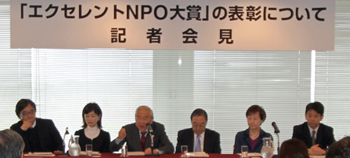A major private-sector conference organized in order to improve the quality of non-profit organizations in Japan will start commending excellently performing NPOs this year.

The People's Conference Aimed at Encouraging Excellent NPOs will extend awards to NPOs selected based on 33 evaluation criteria in four areas.
The Citizens' Award will go to organizations whose activities are open to citizens with opportunities broadly available for them to participate and chances fully provided for each participant to grow as a citizen through NPO activities.
The Problem Solution Ability Award will be extended mainly to organizations that have achieved results by voluntarily trying to solve challenges facing society, and the Organizing Ability Award will go to organizations that operate while developing in a sustained manner by maintaining responsible governance and stable management systems.
With the lapse of a year since the Great East Japan Earthquake, a fourth award has been established to recognize excellent NPOs that operate in disaster-affected regions.
The grand prize will be awarded to one of the organizations selected in the four fields as the most excellent NPO.
Applications will be accepted for two months from March 10. The four best performing NPOs and the most excellent NPO for the first year will be announced at a ceremony in late June.Prizes will be provided to the five organizations.
The People's Conference has three co-representatives -- Kazuo Ogura, former president of the Japan Foundation, Takaji Kunimatsu, president of the Emergency Medical Network of Helicopters and Hospitals, and Kyoko Shimada, president of the Yokohama Arts Foundation.
Genron NPO Representative Yasushi Kudo, who has produced the commendation program, serves as secretary general. Members of its board of directors include Yayoi Tanaka, an associate professor at the National Institution for Academic Degrees and University Evaluation, or NIAD-UE, and Yoshiteru Horie, secretary general of the Association for Aid and Relief, Japan (AAR).

Meeting the media with other members of the conference in Tokyo on March 6, Kudo said that the project has been designed to encourage Japanese NPOs to compete with each other to enhance the quality of their activities and by making their efforts visual to citizens, generate changes in society.

More than 40,000 NPOs have been inaugurated in Japan since the establishment of a law governing such groups in 1998, but their activities remain largely insufficient in terms of quality, Tanaka said.
The commendation project calls on NPOs to return to the starting point and think again about what a desirable NPO is, she said.

Ogoura, one of the three co-representatives, said that citizens' direct participation in efforts to solve social problems is becoming important, as illustrated by volunteer activities after the Great East Japan Earthquake.
NPOs should be "a catalyst" to facilitate their efforts to find a solution, he said.
But he also noted that complacency tends to be seen in NPOs themselves.
Ogoura said he hopes that NPOs will actively apply for the award in order to expand their potential.

Kunimatsu noted that it must be difficult for members of NPOs to assess whether their activities are truly compatible with the social needs and how effectively they are contributing to society.In this sense, it is very meaningful to establish certain criteria to evaluate NPOs, he said.

Shimada, who has been personally involved in philanthropic activities in the business world, said that evaluation itself is not a purpose of the project. Self-evolution accompanied with repeated evaluations is important, she said, adding the disclosure of evaluation results contributes to activating communication between NPOs and citizens, and between NPOs and business corporations.
In a question-and-answer session with the audience, Ogura said that administrative organizations alone cannot effectively deal with social problems because they have to be impartial.
This was felt by many people when Japan experienced the great disaster last year, and as a result, each citizen appears to be becoming more aware of the need to contribute to society, he said.

The number of NPOs has increased, but there are many organizations that only operate within programs undertaken by the national and local governments, Horie said. Their roles are actually less extensive than envisioned, he added.
Because one of the characteristics of NPOs is the flexibility with which they can support people who will not be helped by uniformly designed measures, NPOs must make more efforts to evolve, Horie said.
Post a comment